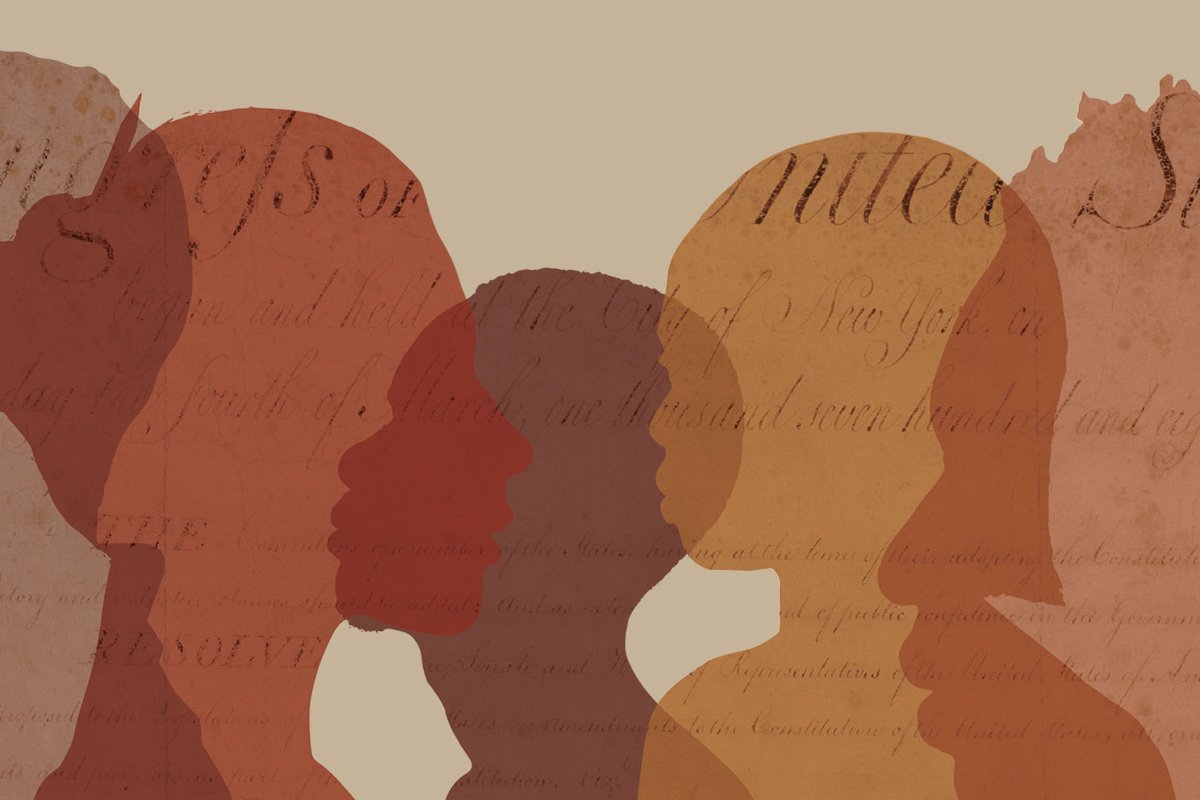
Privilege and Responsibility
James Madison’s vision of civic participation
A popular Government, without popular information, or the means of acquiring it, is but a prologue to a Farce or a Tragedy; or perhaps both. Knowle[d]ge will for ever govern ignorance: and a people who mean to be their own Governours, must arm themselves with the power which knowledge gives.

James Madison wrote these words in 1822 — 35 years after he helped craft the new U. S. Constitution.
Much had changed in those three and a half decades. The nation had expanded from 13 to 24 states, fueled by the booming population growth. In 30 years, the population had more than doubled from 3.9 million to 9.6 million. Settlers had steadily marched westward, seizing lands from American Indian nations and clashing with European empires eager to suffocate the burgeoning power and size of the United States.
As the nation moved beyond its infancy, it experienced many important firsts: the first peaceful transfer of power from one party to another in 1800, the first war with a global superpower in 1812 and the first major sectional crisis over the expansion of slavery in 1820. The Constitution reflected the country’s growing pains, and Congress had passed 12 amendments to the original text.
The Constitution had also begun to acquire significance and symbolism beyond that of a simple governing charter. It was becoming a touchstone around which all Americans could unite in the face of religious, ethnic, sectional or political differences.
But one key element of the Constitution remained the same and exactly as Madison and his fellow Framers had intended — this body of principles requires a vigilant and engaged citizenry to verify that its trust is well placed.
Guidance vs. Instruction
The Constitution is a brief document with only 4,543 words. By comparison, Monaco’s constitution is the shortest in the world at 3,814 words while India’s is the longest at 146,385 words.
The U.S. Constitution spends most of its words doling out powers, limiting the authority of the three branches of government, defining the electoral process and making provisions for future legislation and amendments. But while the document offers some guidance on which branches of government have jurisdiction, it provides almost no instruction about how officials should act while exercising the responsibilities and privileges of their positions.
This vagueness is by design. By the end of the summer of 1787, the delegates at the Constitutional Convention were hot, tired, grouchy and ready to return to their homes. They did not want to spend several months drafting additional clauses.
More importantly, they understood that more language would not necessarily be helpful. The vagueness and silences in the Constitution would permit interpretations of the text. Specificity might prevent its ratification.
The delegates knew that future generations would have their own goals and values, and they should be given leeway to develop their own moral codes. While the Framers were brilliant men with big ideas, they knew they could not predict the future or provide solutions for problems they could not possibly envision.
A Citizen's Responsibility
Before Madison arrived at the Constitutional Convention in Philadelphia, he spent considerable time studying Athenian democracy, a form of government in which laws and policies were decided by the majority of those eligible to participate — a system Madison dismissed as a form of mob rule.
While not all American citizens would formally serve in government, Madison still saw an active and important role that all voters could and should play.
Instead of trying to anticipate and solve for all eventualities, the Constitution includes a few important provisions that call for citizen participation to shape the government’s direction and official behavior. Elections are the most obvious venue for civic participation. Frequent federal elections — every two years for representatives, four years for the president and six years on a staggered cycle for senators — are opportunities for voters to endorse or remove officials.
At the Constitutional Convention, delegates debated the appropriate frequency of elections. On one hand, frequent elections force officials to attend to the needs and demands of voters. On the other, too frequent elections leave politicians overly dependent on the whims of voters and unable to make tough, but just decisions. The delegates ultimately forged a compromise, with a shorter term in the House of Representatives balanced by a longer term in the Senate and halfway in between for the president.
Regardless of the length of tenure, elections require voters to pay attention. They require voters to establish a list of political ground rules and assert expectations beyond what is simply legal or illegal. Over time, these norms and customs constrain and guide politicians and form a complex scaffolding upon which the political system rests.
But Madison and the other Framers understood that elections still left several years at a time before potential electoral consequences. Madison and Alexander Hamilton acknowledged the potential for human failing in the Federalist Papers, a joint publication arguing in favor of the ratification of the Constitution. Hamilton spoke to this specific challenge in Federalist 65.
“The delicacy and magnitude of a trust which so deeply concerns the political reputation and existence of every man engaged in the administration of public affairs” was central to a republican form of government, Hamilton wrote. “A government resting entirely on the basis of periodical elections” would be prone to abuse because “the leaders or the tools of the most cunning or the most numerous faction” might obscure their own misdeeds or those of their supporters.
Another form of oversight was required, Hamilton argued, for “offenses which proceed from the misconduct of public men, or, in other words, from the abuse or violation of some public trust.... [or] injuries done immediately to the society itself.”
Participatory Roles
Here the Constitution again encourages civic participation by urging citizens to define what behavior is appropriate for officials entrusted with positions of power and responsibility and then to enforce that social code accordingly. Article 2, Section 4 of the Constitution declares that the “President, Vice President and all civil Officers of the United States, shall be removed from Office on Impeachment for, and Conviction of, Treason, Bribery, or other high Crimes and Misdemeanors.”
The Constitution empowers the House to bring charges of impeachment and the Senate to serve as the jury, but citizens also have a role. When the delegates crafted this clause, misdemeanor was not a purely legal term. It could mean a lower class of criminal behavior, but it also meant “behaving one’s self ill; an Offence or Fault.” During the first — and only — impeachment proceedings against a Supreme Court justice, Rep. James Elliot of Vermont argued: “To misdemean is to behave ill; a misdemeanor is an act of ill behaviour.”
Similarly, Article 3, Section 1 grants all federal judges, including Supreme Court justices, the right to “hold their Offices during good Behaviour.”
But what does good behavior mean? The Constitution remains silent.
In the same impeachment proceedings, Elliot spoke directly to the heart of this conundrum. Not “every act which, strictly speaking, may be considered as misconduct, ought to subject a judge to impeachment,” he acknowledged. Nor should bad conduct, just because it is strictly legal, always be deemed “good behaviour.” Citizens are tasked with determining what legal behavior is beyond the pale.
Both responsibilities — participation in regular elections and adjudicating the boundaries of good and bad behavior — require attentive and informed citizens who are educated about politics, government and law.
Engaged and Educated
Madison and many of his contemporaries feared the consequences of uninformed or unengaged citizens. At best, the government would fail to pass necessary measures for national defense and economic prosperity without civilian oversight. At worst, politicians would take advantage of the leniency to pursue corrupt ends.
Just a few years after the ratification of the Constitution, Noah Webster, a newspaper editor and creator of the original Webster’s dictionary, offered one solution to prevent against the uninformed and unengaged. “Education, in a great measure,” he wrote, “forms the moral characters of men, and morals are the basis of government.”
Madison agreed, for he was inspired to write his 1822 letter by the “liberal appropriations made by the Legislature of Kentucky for a general System of Education.” These provisions for public education “can not be too much applauded,” he wrote. Education throws “that light over the public mind which is the best security against crafty & dangerous encroachments on the public liberty.”
George Washington, Thomas Jefferson, Benjamin Franklin and Benjamin Rush similarly emphasized the importance of education to the health of the republic by leaving money in their wills for educational institutions or forming academies or colleges while they were still alive.
And education should not be reserved only for the young. Libraries, lending societies, museums and civic organizations, which Franklin pioneered, enabled Americans of all ages and economic statuses to cultivate their minds and remain informed on the news of the day.
Perhaps most important, Madison believed engaged, educated citizens were essential to the longevity of the Constitution and the republic. As a student of history, Madison knew most republics failed. The United States would survive only if the Constitution could evolve with its people.
As he left the Constitutional Convention, Madison struggled to contain his disappointment. The draft was not the document he had envisioned, but he accepted compromises as the best option that could be had at that moment.
In Federalist 43, Madison wrote about the importance of future amendments as a method for “the general and the State governments” to resolve “errors, as they may be pointed out by the experience on one side, or on the other.”
Madison stayed true to this prediction and ushered the first 10 amendments, now known as the Bill of Rights, through the first session of Congress in 1789. He initially was opposed to a listing of rights, which he dismissed as “parchment barriers,” the omission of which was not “a material defect.” But he began to change his mind when his friend Thomas Jefferson, then stationed in Paris, argued that the omission was an obstacle.
“A bill of rights is what the people are entitled to against every government on earth,” Jefferson wrote.
The amendment process requires civic participation, from the initial demand for constitutional revision to the ratification process. Citizens must petition their representatives to introduce the amendment, pressure their congressmen to pass the amendment and demand that their state legislatures ratify the amendment.
Every year, the country celebrates Constitution Day on Sept. 17, the day the Convention sent its draft to Congress for review. And it is a day that serves as a reminder of the core principles of educated and engaged civic participation that are the best ways to honor the creation of Madison and his colleagues.
More from this Issue

